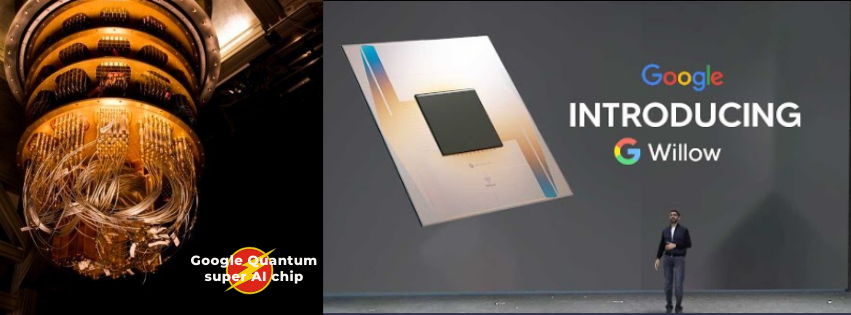
Breaking news: Google’s Quantum Chip ‘Willow’ has broken the quantum computer records
Exciting news from Google! Their new quantum chip, Willow, has made headlines by accomplishing tasks in just minutes that would take classical supercomputers an astonishing 10 septillion years. This breakthrough paves the way for more scalable quantum computing, and it’s a game changer!
Key Highlights
Speedy Solutions: Willow can solve complex problems in under 5 minutes, far outperforming the world’s fastest supercomputer, Frontier, which would take eons—literally—longer.
Future Potential: While we don’t have real-world applications just yet, the possibilities for Willow are vast. It could revolutionize fields like medicine, energy, and AI, particularly in areas like drug discovery and fusion energy research.
What Makes Willow Special?
Unveiled by Hartmut Neven, the founder of Google Quantum AI, Willow’s impressive performance stems from a breakthrough in quantum error correction. This process ensures that calculations are accurate, which is crucial for reliable quantum computing.
Willow completed a random circuit sampling benchmark in record time, showcasing how increasing the number of qubits (the basic units of quantum information) reduces errors significantly. Neven explained, “Errors are one of the biggest challenges in quantum computing. Willow shows that the more qubits we use, the fewer errors we have—a tipping point for scalable quantum computing.”
Made with Superconducting Qubits
Fabricated at Google’s facility in Santa Barbara, Willow uses superconducting qubits—a technology also adopted by other tech giants like IBM and Amazon. Neven expressed confidence in this approach, saying, “Our money is on superconducting qubits,” while also noting that they’re exploring other options, like neutral atom qubits.
Looking Ahead
While the advancements are impressive, Google acknowledges that there are still hurdles to overcome before we see practical applications. Neven pointed out, “If you can’t win at least on one problem, you won’t win on a useful problem either.” However, he believes that relevant commercial use cases are now getting closer to reality.
Potential future uses for quantum computing could span across various sectors, transforming how we approach challenges in medicine, energy, and artificial intelligence. For example, quantum computing might enable breakthroughs in drug discovery, battery design, and fusion energy research.
Neven emphasized that advanced AI could greatly benefit from quantum computing, opening doors to groundbreaking opportunities in these critical areas.
In short, Google’s Willow chip is not just a technological marvel; it’s a glimpse into a future where quantum computing could reshape industries and tackle some of the world’s toughest challenges. Stay tuned as we watch this exciting journey unfold!
(Generated AI)
More about Google quantum AI chip